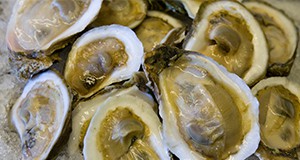The absorption of atmospheric carbon dioxide by the oceans has changed the chemical properties of seawater and made it more acidic all over the world. Florida, with an extensive coastline and deep cultural and economic ties to marine resources, will be directly affected. This 4-page fact sheet written by Lisa Krimsky, Joseph Henry, and Joshua Patterson and published by the UF/IFAS Program in Fisheries and Aquatic Sciences, School of Forest Resources and Conservation focuses on the spatial and temporal variability in oceanic pH and provide an overview of pH variability in Florida's coastal waters.
https://edis.ifas.ufl.edu/fa227
Tag: Joshua Patterson
Ocean Acidification: Calcifying Marine Organisms

Rising atmospheric carbon dioxide concentration leads to ocean acidification and threatens coastal and marine ecosystems and organisms. This 4-page fact sheet written by Joseph Henry, Joshua Patterson, and Lisa Krimsky and published by the UF/IFAS School of Forest Resources and Conservation, Program in Fisheries and Aquatic Sciences explores the impacts of ocean acidification on calcification, the process corals, bivalves, echinoderms, and planktonic organisms use to build their shells and skeletons. Understanding how ocean acidification affects calcification is important for scientists seeking to determine the real-world implications and impacts of ocean acidification on some of the most important species in the marine environment.
https://edis.ifas.ufl.edu/fa220
Ocean Acidification: Fish Physiology and Behavior
Increased atmospheric carbon dioxide has led to increased levels of dissolved carbon dioxide in the oceans and acidified ocean water, which could have direct effects on the physiology and behavior of fishes. This 5-page fact sheet written by Joshua Patterson, Lisa Krimsky, and Joseph Henry and published by the UF/IFAS School of Forest Resources and Conservation, Program in Fisheries and Aquatic Sciences will summarize the current state of our understanding on the topic, with special emphasis on Florida fishes. It will also address current challenges in understanding the real-world effects of a complex global process using data largely collected on isolated fish in laboratory experiments.
https://edis.ifas.ufl.edu/fa219
Ocean Acidification: An Introduction
Ocean acidification is the ongoing decrease in ocean pH caused primarily by the ocean’s taking up excess carbon dioxide from the atmosphere. Other impacts related to climate change (increased sea level rise, coastal flooding and extreme weather events) often receive more attention, but the acidification of the Earth’s oceans is well documented and is a major concern for the marine science community. This 4-page fact sheet written by Joshua Patterson and Lisa Krimsky and published by the UF/IFAS Program in Fisheries and Aquatic Sciences, School of Forest Resources and Conservation is the first in a series that addresses ocean acidification in Florida. It specifically explains the changes that are occurring to the chemistry of our coastal and oceanic waters because of elevated carbon dioxide levels. Additional publications address potential environmental, economic, and social implications for Florida.
http://edis.ifas.ufl.edu/fa206
